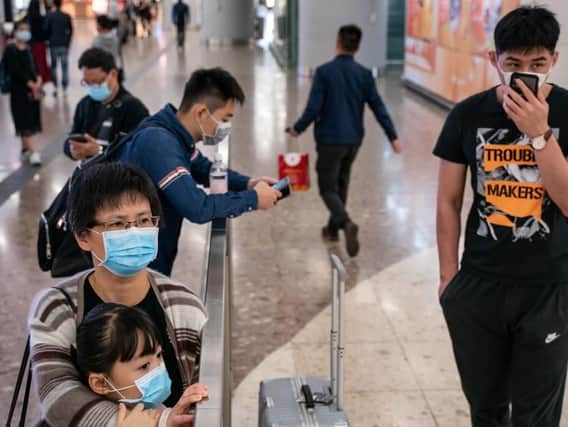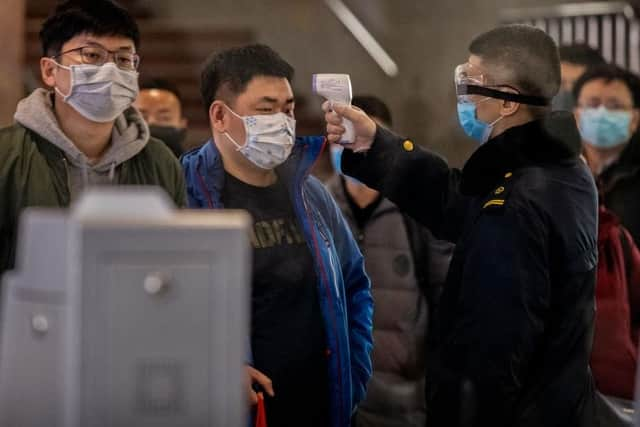The latest news on the China coronavirus in the UK, after PHE warns cases are ‘highly likely’


A Public Health England (PHE) boss has warned that cases of the new strain of coronavirus are "highly likely" in the UK.
With Chinese New Year celebrations taking place on 25 January, Chinese nationals will be travelling to and from loved ones, which is feared to increase the risk of the virus' spread.
Advertisement
Hide AdAdvertisement
Hide AdAt the time of writing, there have been no confirmed cases of the coronavirus in the UK, and the official advice from the government is that the risk of the virus reaching UK shores is "low."


Fourteen people have been tested for suspected coronavirus in the UK and five of them have been given the all clear while nine are awaiting results, according to Public Health England.
Here's everything you need to know:
Where are the suspected UK cases?
According to the Scottish Government at least five patients in Edinburgh and Glasgow are undergoing hospital tests after travelling from Wuhan, the Chinese city where the first cases were registered three weeks ago.


The Scotsman reported that while none of the cases have been confirmed so far, two had been diagnosed with influenza after travelling to Wuhan.
A statement released on Thursday evening said that the other three patients are "undergoing testing on a similar precautionary basis".
At least one of the suspected cases is a student in the Scottish capital and several UK universities announced that they were taking measures to inform Chinese students to remain vigilant.
An incident team has been set up in Scotland to deal with the health threat.
A man is being treated for symptoms of coronavirus in Belfast's Royal Victoria Hospital, according to the BBC.
Advertisement
Hide AdAdvertisement
Hide AdHe travelled to Northern Ireland from the city of Wuhan and it's believed he's being treated in an isolation ward as a precautionary measure.
Another person was tested in Wales and given the all clear last week.
Michael Hope, an artist from Newcastle, was also cleared after spending two days in quarantine this week. He had developed a "nasty cough" after travelling back to Newcastle from Wuhan.
None of the patients who are being tested have been confirmed as having the virus.
What measures are in place to stop the virus spreading?
Downing Street insisted the measures in Scotland were “purely precautionary”. Nicola Sturgeon told MSPs authorities were “closely monitoring” the spread.
"I should say, that the risk to the public here in Scotland – and indeed the UK – is currently classified as low but that is kept under review,” the First Minister added.
Chester University warned that any students travelling to China would be placed in quarantine upon their return. There are currently 120,000 Chinese students enrolled in the UK, the largest body of foreign students in the UK.
"UK public health measures are world leading and our excellent NHS is well prepared to manage and treat new diseases," said Public Health England.
Advertisement
Hide AdAdvertisement
Hide Ad"We have been carefully monitoring the situation in Wuhan for some time and are ready to put in place proportionate, precautionary measures."
Those measures include a "Port Health team" who will meet each direct flight aircraft from Wuhan "to provide advice and support to those that feel unwell."
"They will check for symptoms of coronavirus and provide information to all passengers about symptoms and what to do if they become ill."
Should I be worried?
The coronavirus has been compared to the 2002-03 outbreak of SARS which infected 8,000 people in 37 countries and killed 774.
The UN criticised China for concealing the scale of the SARS virus, but this time around the Chinese Government has responded to the new strain of the coronavirus with tough measures.
Chinese scientists have shared this new pathogen’s genome with researchers around the world, helping medics to identify fresh cases.
Several cities have been quarantined, notably China’s seventh largest, Wuhan, a transport hub with direct flights to major airports in Asia, the US and Europe, including Heathrow.
The mortality rate of 3 per cent is, on the face of it, concerning but at this stage may be wildly inaccurate, since a substantial number of infected people experience mild symptoms and may not be identified.
Advertisement
Hide AdAdvertisement
Hide Ad"Based on the available evidence, the current risk to the UK is considered low," said Dr Nick Phin, Deputy Director, National Infection Service at Public Health England.
What is the coronavirus?
The virus is a new strain of coronavirus, which is in the same family as SARS and MERS (Middle East respiratory syndrome).
This particular strain originated in Wuhan City, Hubei Province, the largest city in central China.
Coronaviruses are a large family of viruses, with the Centers for Disease Control and Prevention (CDC) explaining they usually cause “mild to moderate upper-respiratory tract illnesses”, like the common cold.
Most people get infected with these viruses at some point during their lives, although they usually only last for a short period of time.
Symptoms of the virus may include:
- runny nose
- headache
- cough
- sore throat
- fever
- a general feeling of being unwell
There are currently no vaccines to protect against coronavirus infection, but there are ways to help reduce your risk of contracting it.
The CDC advise:
- washing your hands often with soap and water for at least 20 seconds
- avoid touching your eyes, nose, or mouth with unwashed hands
- avoid close contact with people who are sick
If you are experiencing cold-like symptoms, you can help reduce the risk of spreading it by staying at home while you are ill, and avoiding close contact with others.